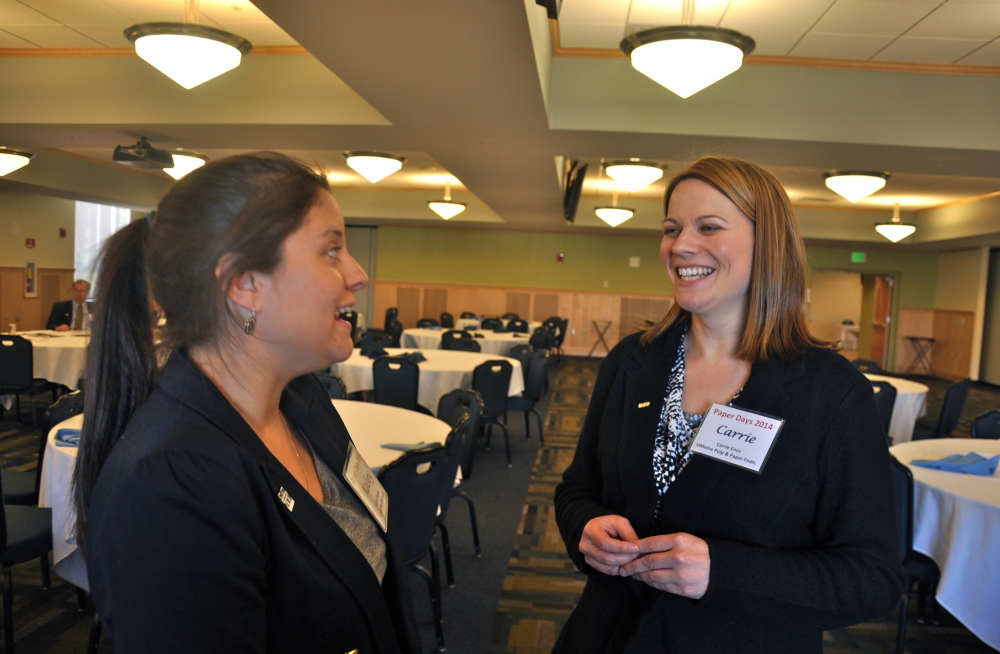Kelsey Bolduc wanted to be a lawyer when she was a student at Messalonskee High School in her hometown of Oakland. Today, she’s a chemical engineering student at the University of Maine with a full scholarship provided by the University of Maine Pulp and Paper Foundation.
Bolduc’s decision to set aside the law-school track for one she hopes will lead to a job at a Maine paper mill is something those in the state’s pulp and paper industry would like to see more of. To enhance that probability, the University of Maine Pulp and Paper Foundation held its 64th annual Paper Days this week to bring together UMaine students, faculty, and professionals in the pulp and paper industry to discuss how to better prepare students for careers in the field.
A top priority for organizers: how to change the perception that the industry is on its knees and show it’s still a viable career in the 21st century.
“There are a ton of jobs in the paper industry,” said Donna Cassese, manager of Sappi Fine Paper’s mill in Westbrook, formerly known as S.D. Warren. “And it doesn’t matter if you’re mechanically inclined or want to go to college to be a process engineer.”
Cassese’s mill is the oldest in the state, built in 1854, but it has come a long way since its days of producing low-margin commodity paper like printer paper or newsprint. Thanks to millions invested in research and development, Sappi’s Westbrook mill now produces release paper, which is used in making products – such as shoes, clothing and soccer balls – that need a certain texture. The mill produces 40 percent of the world’ supply of release paper, a much more valuable commodity than conventional paper products.
The data backs up Cassese’s claim that there are plenty of jobs in Maine’s paper industry.
For the past three years, the University of Maine Pulp and Paper Foundation has placed 100 percent of its scholarship students in jobs after graduation, according to Carrie Enos, the foundation’s newly appointed president.
“Tell me where else you could find that?” Cassese said.
The foundation provides between 20 and 24 scholarships a year – some are full rides, others cover only a portion of tuition – at a cost of nearly $700,000. It currently has 87 scholarship students at UMaine who study chemical engineering, mechanical engineering, electrical engineering and forestry – all skills that the mills need as the industry faces an aging work force nearing mass retirements, Enos said. The average age of a Maine millworker is about 58, according to the Maine Pulp and Paper Association.
But changing the perception of an industry associated with mill closings and layoffs is challenging.
“One of our goals is to expand our outreach and help people understand that the paper industry is vibrant,” Enos said. “There is still significant demand for people to fill jobs in the industry. I don’t think we do a very good job of advertising that.”
Enos said that means doing more to connect with high school students, and perhaps more importantly, parents and teachers. One program, called Consider Engineering, brings about 100 high school students to UMaine for three days to experience what it’s like to study chemical, mechanical and electrical engineering.
The Consider Engineering program made Bolduc, the UMaine sophomore, rethink her plan to become a lawyer. Bolduc’s father, who works in Sappi’s Somerset paper mill in Skowhegan, knew his daughter had a knack for math and science and convinced her to at least give the Consider Engineering program a shot.
“He said, ‘Go to this and if you don’t like engineering I’ll stop pestering you,’ ” Bolduc said. “I figured, ‘Why not? I’ll be home in three days.’ ”
Bolduc was pleasantly surprised by the experience. Once home, she decided to study chemical engineering, and that winter applied to the UMaine program. Shortly after, she applied to the foundation for a scholarship, and received it.
Enos, who was named president of the foundation in January, was similarly inspired. Also a Consider Engineering alumnus and scholarship recipient, she graduated from UMaine with a degree in chemical engineering in 1999. She said 60 percent of the high school students who participate in the Consider Engineering program apply for a foundation scholarship.
Besides the financial support, the scholarships also offer students some work experience. Students are required to intern in Maine mills. By the time they graduate, they typically have been learning on the job for eight months.
This fall, Bolduc will spend the semester working at the Sappi mill in Skowhegan. She said she feels secure in her decision to drop law, but even she can be affected by the negative headlines about the paper industry. The closure of the Great Northern Paper mill in East Millinocket, layoffs at Lincoln Paper and Tissue, and the on-again, off again merger of the NewPage and Verso mills were in the news as she was applying for fall internships last year.
“Reading those headlines, I was unsure of where that would put me,” she said. “But then I received seven internship offers. Everyone thinks the industry’s doing badly, but how can it be bad if I get seven internship offers?”
Whit Richardson can be contacted at 791-6463 or at:
wrichardson@pressherald.com
Send questions/comments to the editors.



Success. Please wait for the page to reload. If the page does not reload within 5 seconds, please refresh the page.
Enter your email and password to access comments.
Hi, to comment on stories you must . This profile is in addition to your subscription and website login.
Already have a commenting profile? .
Invalid username/password.
Please check your email to confirm and complete your registration.
Only subscribers are eligible to post comments. Please subscribe or login first for digital access. Here’s why.
Use the form below to reset your password. When you've submitted your account email, we will send an email with a reset code.